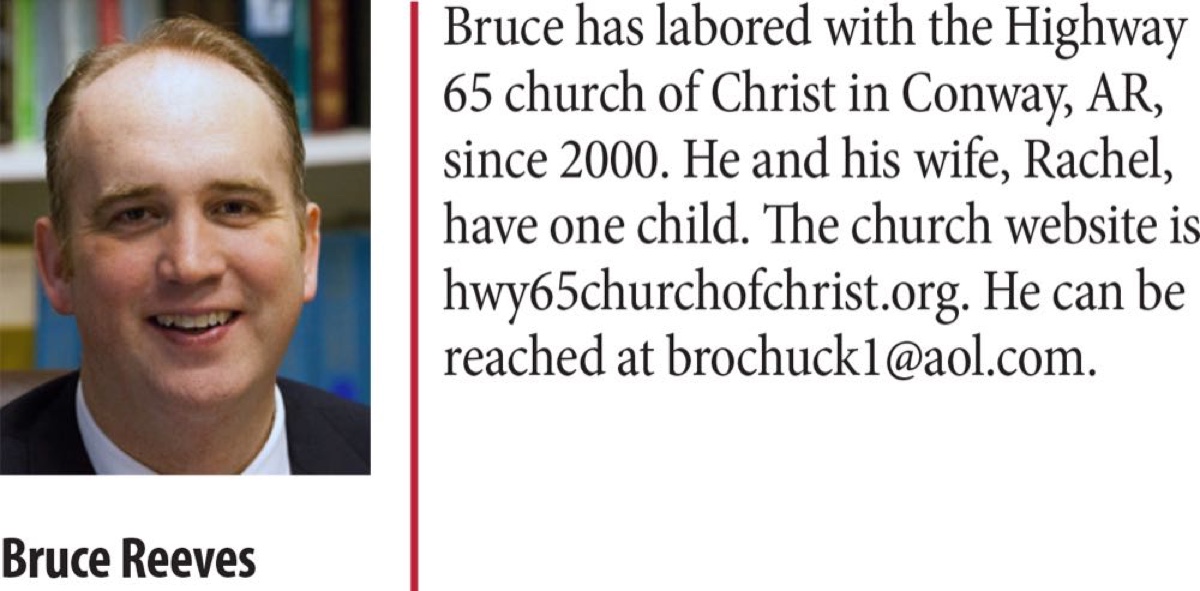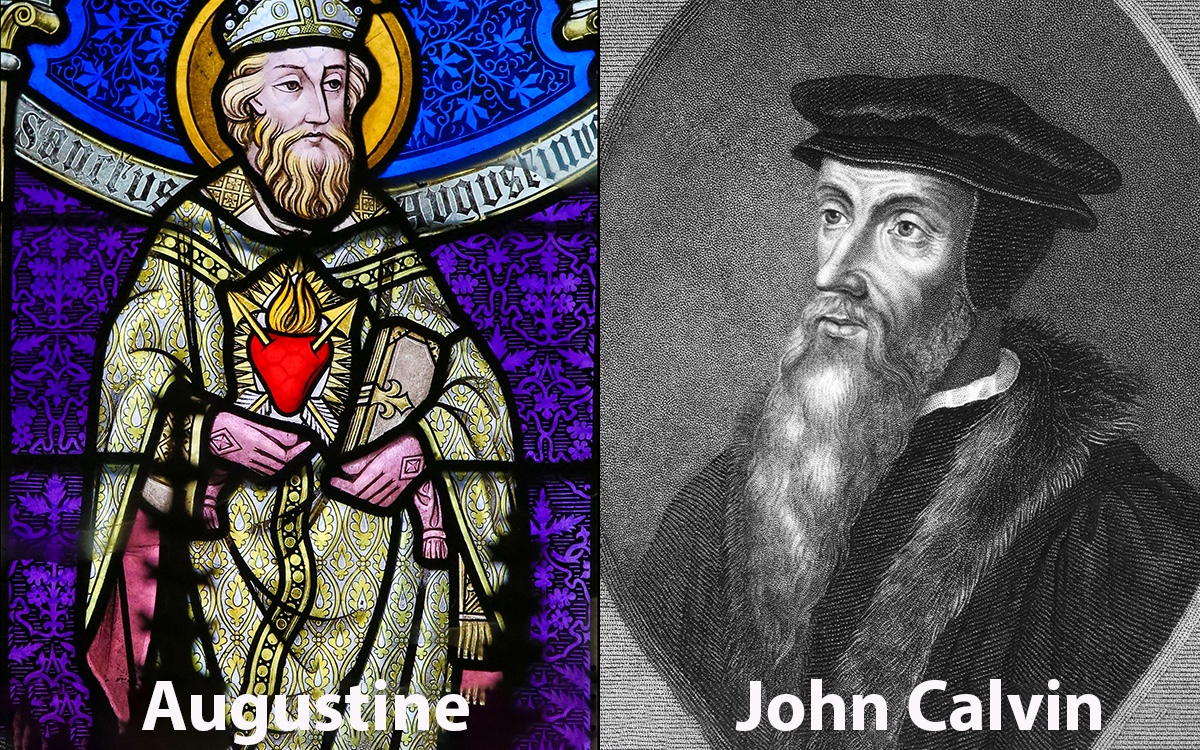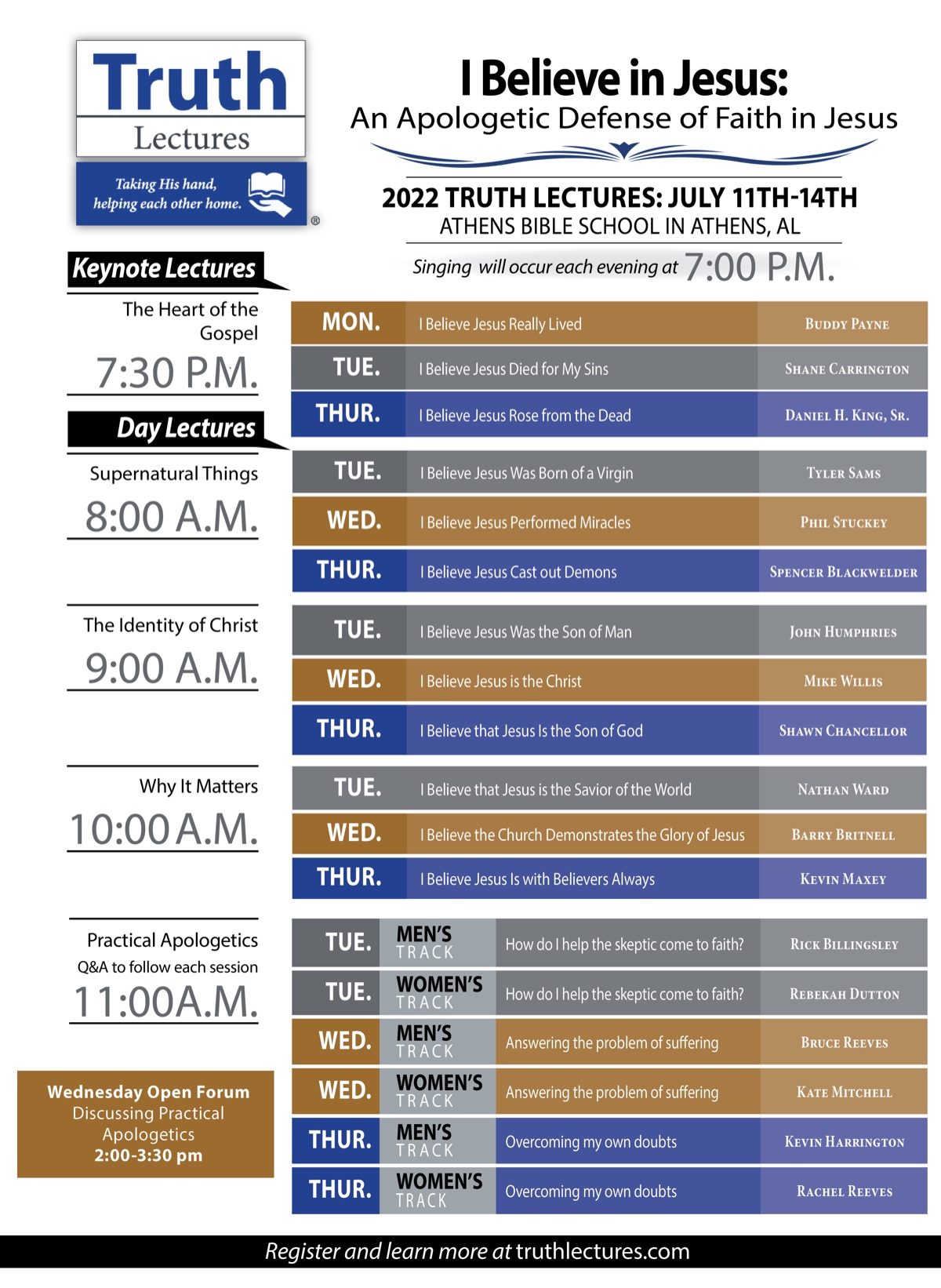By Bruce Reeves
Synopsis: Coming to see God’s faithful love, divine glory, and saving grace is life-changing and transforming.
Coming to see God’s faithful love, divine glory, and saving grace is life-changing and transforming (Rom. 12:1-2; 2 Cor. 3:17-18). Nevertheless, there are human doctrines that speak of God’s “sovereignty,” “grace,” “glory,” and “love,” which yet undermine the mercy and faithfulness of the Lord. Reformed Theology, commonly known as Calvinism, has saturated the denominational world and influenced our brethren in a variety of ways.
Some have termed Reformed Theology as Augustinian-Calvinism because, although John Calvin systematized what is known as the TULIP theory, many of his ideas were expressed a thousand years earlier by Augustine. Someone may ask, “Isn’t this a really old doctrine?” Yes, it is! Augustine of Hippo lived from 354 to 430, and John Calvin lived from 1509 to 1564, but it continues to influence many religious people today. Time Magazine addressed the “10 Ideas Changing the World Right Now.” In that issue, David Van Biema described what is called the “New Calvinism” as the third most influential idea in our world today. He writes,
Calvinism is back and not just musically, “Evangelicalism’s latest success story, complete with an utterly sovereign and micromanaging deity, sinful and puny humanity, and the combination’s logical consequence, predestination: the belief that before time’s dawn, God decided whom He would save (or not), unaffected by any subsequent human action or decision.”
New Calvinism is just the old Calvinism with new worship styles and popular preachers such as John Piper, Tim Keller, and Matt Chandler. It really is the same systematic doctrine which must be identified as error. Although the reading of diverse religious materials can be profitable, it is disconcerting when those preaching the gospel are hypercritical of the writings of faithful brethren from the past. Also, they promote the verbiage, concepts, and substance of Calvinistic writings concerning fundamental issues regarding salvation.
It is vital for us to recognize that there are various forms of Calvinism. There is what has been rightly described as “Classic Calvinism,” or “Hard Calvinism,” while other forms may be expressed as “neo-Calvinism” or “soft Calvinism.” Classic Calvinism involves what has often been described as the TULIP theory, which includes all five points of Reformed Theology: Total inherited depravity (i.e., human inability to believe), Unconditional election, Limited atonement, Irresistible grace, and the Perseverance of the saints (i.e., the impossibility of apostasy).
While even proponents of Classic Calvinism have their differences, these tenets remain the same. It is important for us to realize that one can be guilty of teaching shades of Calvinism without subscribing to all these points. Just because someone cannot explain or does not fully embrace the complete system of Calvinism, does not mean that they have not accepted the doctrine in some measure. Having said that, let us recognize that Calvinism is a tightly constructed system. Much like dominos, once one domino falls, all logically tumble, and the entire system collapses. On the other hand, if the Calvinistic view of sovereignty and freewill are accepted, the rest will naturally follow. Therefore, men like John Macarthur, John Piper, R.C. Sproul, and James White have been quick to point out the inconsistencies of those who attempt to offer soft-Calvinism (James White, The Potter’s Freedom).
Yes, the doctrines of unconditional election, total inherent depravity/human inability, limited atonement, irresistible grace, and the perseverance of the saints are all essential tenets of Classic Calvinism. Yet, it is a misunderstanding of God’s sovereignty that serves as the foundation of Reformed Theology. It is here that we must begin our consideration of the true meaning of The Sovereign Love of God.
The overarching principle of Calvinistic thinking sees the tension between the concepts of divine sovereignty and human freedom as having its chief emphasis on God’s absolute, meticulous, and micro-managing control over every detail of the process. Adherents begin their theological journey with the premise that God knows all things, because He predetermined or decreed all things to happen. As a result, Reformed Theology constantly refers to sovereignty terminology, such as, “sovereign control,” “sovereign purpose,” “sovereign will,” “sovereign decrees,” “sovereign determinations,” “sovereign counsel,” “sovereign foreordination,” etc. Yet, an honest examination of biblical teaching regarding God’s true sovereignty, authority, reign, grace, faith, and human freedom unravels and refutes the false teaching of this doctrinal system. Calvinistic advocates have attempted to redefine biblical concepts in an unbiblical way, asserting that if non-Calvinists do not accept their views of divine sovereignty and election, then they deny God’s sovereignty, grace, and glory. To those who are wedded to this idea, clearly this kind of warped thinking has become the center of their theological universe. A. W. Pink wrote:
The doctrine of God’s sovereignty. . . is the center of gravity in the system of Christian truth—the sun around which all lesser orbs are grouped. It is the golden milestone to which every highway of knowledge leads and from which they all radiate. It is the cord upon which all other doctrines are strung like so many pearls, holding them in place and giving them unity. It is the plumb line by which every creed needs to be measured, the balance in which every human dogma must be weighed (Pink, 139).
Such a view is a distorted overstatement, even if one were to assume that the doctrine itself was biblically correct. That is not a safe assumption to make! Consistent Calvinism has a deterministic view of sovereignty that sees the unconditioned will or decree of God as the only true cause of every event—without exception. The corollary to this is that the human will is not truly free. Although many Calvinists attempt to refute this, they must be inconsistent to do so. This inconsistency destroys their system. Calvinistic compatibilism (the view that we are only free to do what God has unalterably decreed) is contradictory, because it begins with a false premise. Libertarian freewill (the view that God created humanity with the ability to choose good or evil without His foreordaining the decision) harmonizes with the permissive will of God as revealed in the Scriptures.
Those who argue that non-Calvinists, by necessity, deny the sovereignty of God are misinformed or dishonest. They attach the logical conclusions of their view to those who do not accept their beliefs. When defenders of Calvinism are held accountable for the consequences of their theology, they frequently begin to speak of “misrepresentations,” “caricatures,” and “unfair evaluations” of their teaching. Yet, they continue to present views which demand that God is the “first cause of evil.” Our objection is not to the God of the Bible, but to the Calvinistic attack on His nature.
The Scriptural view of God’s sovereign authority differs greatly from that of Reformed Theology. God’s sovereignty necessarily means His complete freedom and authority (or right) to act in any way He wills that is in harmony with His nature and purpose (1 John 1:5). On this view, God certainly has the freedom and authority to not exercise meticulous control. For the non-Calvinist, if God chooses to not exercise meticulous control, that decision is itself a sovereign choice. To deny His right to do so is to deny His divine sovereignty and faithful love. The truth is that God has sovereignly decreed that humanity, as His creation, be able to make a freewill choice lovingly to serve the Lord or reject Him (Josh. 24:14-16; Matt. 23:37; 2 Tim. 2:4; 2 Pet. 3:9). He sovereignly decreed that the only way for mankind to be saved was through Jesus Christ (Acts 2:22-23). He sovereignly decreed that the gospel be preached to the whole world (Matt. 28:18-20). He sovereignly decreed the conditions of faith that sinners must meet to be forgiven of their past sins (Mark 16:16; Acts 2:38; 8:35-39; 22:16; Rom. 10:9-10; 1 Pet. 3:21). God’s sovereignty promises to reward everyone according to his decision. Paul writes, “Do not be deceived. God is not mocked; for whatever a man sows, this he will also reap. For the one who sows to his flesh will from the flesh reap corruption, but the one who sows to the Spirit will from the Spirit reap life everlasting” (Gal. 6:7-8). Who is really denying God’s sovereign will?
Unfortunately, when one develops an erroneous view of the sovereignty of God, his interpretation of Scripture will be distorted and unbalanced. Reformed Theology’s view of God’s sovereignty contradicts His redemptive love for all persons. In contrast, the biblical view of divine sovereignty harmonizes beautifully with the Lord’s love for the world (John 3:16; 1 John 2:2). Calvinists are guilty of double talk. According to their doctrine, God condemns sinners to an eternal hell for sins He foreordained that they commit in the first place. We are told that God is the “first cause of evil,” but in the next breath that He is not “the author of sin.” Who can believe it?
Both evil and good come from God. . . So what happens when you emphasize the will of man, then evil becomes only associated, there is no sense in which God decrees evil, there is no sense in which God wills evil and so evil is only from the heart of man and from the heart of Satan. . . but we recognize as reformed Christians that those are secondary causes, that the first cause of evil is God, Himself. . . Man does not resist evil when he is fulfilling the decrees of God (Cook, 181).
The devil is God’s devil. He does what God allows him to do, he does what God commands him to do, no more and no less (Cook, 151).
Ironically, those who defend the sovereign love of God for the whole world are accused of being “unregenerated enemies of God’s grace and teachers of the doctrines of demons.” Frequently, teachers of error will accuse others of the very things of which they are guilty. Denials notwithstanding, Calvinism’s portrayal of God is of an unjust, sinful, dishonest, arbitrary, partial, and unloving God. Somehow, we are to believe that these logical consequences of the god of Calvinism bring Him glory.
The Bible reveals different aspects of God’s will. We observe His prescriptive, perceptive, permissive, and decretive will. God has prescribed or commanded all men everywhere to repent (Acts 17:30-31), and His desire is that all men would choose to obey Him and be saved by His grace (1 Tim. 2:3-4; 2 Pet. 3:9). Yet not all men will be saved because not all men are willing to repent (Matt. 7:13-14; Rom. 2:2-11). Thus, although God desires all men to repent, He also desires human freedom, therefore He permits the disobedient to reject Him (Rom. 10:1-3; 11:11-22). While God permits evil for His eternal purposes, He did not foreordain or prescribe such evil. The notion that He commanded and unchangeably foreordained every evil act, including Satan’s decisions and influence, is blasphemous (John 8:44). The logical consequence of the Calvinistic view of sovereignty leads to the conclusion that every vile, wicked, and deviant act of abuse ever foisted upon a person or nation was the unalterable and predetermined will of God.
Our sovereign Creator reigns over all the earth and “upholds all things by the word of His power” (Job 42:9; Isa. 45:7-9; Acts 4:27-29; John 1:1-3; Col. 1:16-17; Heb. 1:3). Before there was anything else, there was the Uncreated One, the Great I Am (Exod. 3:14; John 8:58). The psalmist said, “From everlasting to everlasting, you are God” (Ps. 90:2). There was never a time when God was not. In fact, He existed eternally before all things and is Creator (1 Cor. 8:6; Rev. 4:11). He is called “the First,” “the Beginning,” “and the Alpha” (Rev. 1:8, 17; 21:6). The Lord “framed the worlds,” and He alone has eternal “immortality” and “dwells in unapproachable light” (1 Tim. 6:16; Heb. 11:3). Not only has He created all things and upholds all things, but He is above all things (Ps. 8:1; 57:5; Eph. 4:6). God has the power to do whatever is in harmony with His will and nature (Job 32:7; Isa. 46:10; Jer. 32:37; Luke 1:37). He rules and reigns as Creator, King, and Judge! Our Lord’s divine reign and love are affirmed by His power, grace, and impartiality (Rom. 2:1-11).
It is not an issue of God having divine power, but rather the exercise of His power. Does the Lord not limit His power for the sake of His love, grace, holiness, and promises? Our Creator is not only all-powerful and all-wise but also has the attribute of relationality and seeks to have fellowship with all those who will come to Him (Gen. 1:26-28; Matt. 11:28-30; Rev. 22:16). Paul declared to the Athenians, “He made from one man every nation of mankind to live on all the face of the earth, having determined their appointed times and the boundaries of their habitation, that they would seek God, if perhaps they might grope for Him and find Him, though He is not far from each one of us. . .” (Acts 17:26-27). The Lord’s omnipotence is always exercised in faithful love and steadfast truth. We read that He rested on the seventh day—after the creation (Gen. 2:1-3), that His eternal Son humbled Himself to become flesh (Matt. 1:23; John 1:14; 2 Cor. 8:9; Phil. 2:5-11) and promises to never destroy the world by a flood again, but rather by fire (2 Pet. 3:6-8). Likewise, God desires all men to be saved, but He does not save every person despite His desire to share a loving and holy relationship with all humanity. God limits His power to ensure that the saved freely surrender to His gospel, and His righteousness is preserved (2 Thess. 1:6-9; 2 Pet. 3:9-10). It is His long-suffering that has prevented Him from destroying the world already. Peter instructs believers to “regard the patience of our Lord as salvation” (2 Pet. 3:15).
Once we come to understand the nature of God’s sovereignty and love in contrast to the false presentation of the god of Calvinism, then our eternal salvation comes into clear focus, and we see the full glory and beauty of Christ’s amazing grace. Let us see the majesty and glory of the perfect harmony and unity of God’s divine attributes.
Cook, Gene, and Bruce Reeves. Reeves-Cook Debate on Baptism. Bowling Green, KY: Guardian of Truth Foundation, 2006.
Pink, A.W. The Sovereignty of God. Christian Classics Ethereal Library. (CCEL.org), 1918, 1921, 1929, 1949. https://ccel.org/ccel/pink/sovereignty.xv.html
Van Biema, David. “10 Ideas Changing the World Right Now: The New Calvinism.” Time, March 12, 2009.
White, James. The Potter’s Freedom: A Defense of the Reformation and the Rebuttal of Norman Geisler’s Chosen But Free. Amityville, NY: Calvary Press Publishing, 2000.


